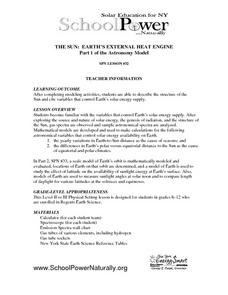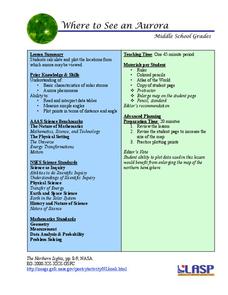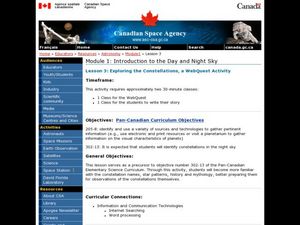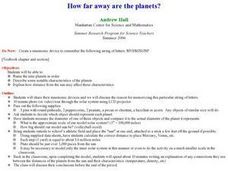Core Knowledge Foundation
Astronomy Tell It Again!™ Read-Aloud Anthologys
A read-aloud anthology focuses on astronomy. Each week for three weeks, first graders are introduced to and listen to a text, answer comprehension questions, then complete extensions that include a learning activity and skills practice....
K5 Learning
The Astronomy Project
A passage about an astronomy lesson may leave readers starstruck. Fifth graders read about a class's exploration into the makeup of the galaxy and its constellations before answering six questions about the terms and vocabulary words...
K5 Learning
Space Based Astronomy
How much astronomy can you study with the naked eye? Learn more about the ways scientists explore the galaxy with a short reading passage and set of short-answer questions.
Curated OER
Earth Science Lesson Plans on Geologic Time
Springboard your fourth and fifth graders into the study geologic time. They will complete 7 activities to learn about geologic time and the topics most often associated with it: astronomy, creation, planet formation, volcanology,...
Curated OER
The Sun: Earth's External Heat Engine - Part 1 of the Astronomy Model
Designed by School Power...NaturallySM, this lesson familiarizes advanced earth science and physics learners about the variables that affect our supply of solar energy. They examine gas spectra and perform calculations. There is an...
Space Awareness
Living in the Milky Way
Get to know our galaxy with an astronomy-themed, hands-on activity. Scholars watch an informative video, answer questions, and construct a model of the Milky Way in order to examine its contents and the distance inside it.
Curated OER
Astronomy
Pupils explore space science by utilizing education software. In this moon cycles lesson, students discuss the importance of the moon and the different phases we observe from earth. Pupils demonstrate the earth's orbit by creating a...
PHET
Where to See an Aurora
Where can you see an aurora in North America? After completing an astronomy activity, scholars can locate the exact coordinates. Pupils plot points of the inner and outer ring of the auroral oval and answer questions based on their...
Curated OER
Observation and Inference
Assess your young scientists' understanding of the difference between observation and inference with this 20-question multiple choice quiz. It reviews a variety of physics and astronomy concepts, such as solar eclipses and sunspots, the...
Curated OER
Interactive Online Light Activity
Learners participate in an online interactive activity in which they discover types of light, wavelengths of light, and how astronomers use different wavelengths. Activity includes links for other activities and lab activities including...
Princeton University
A Teacher's Guide to the Universe
Astronomers only observe four percent of the universe as the rest hides in darkness. The size, shape, and movement of the universe are the focus for an long-term high school unit. Its 43 lessons include hands-on experiments, direct...
Curated OER
There Are So Many Stars
Students explore the night sky. In this astronomy lesson, students discover a song about the stars in the sky and participate in a flannel board activity pertaining to the song.
Curated OER
Distance in Space
Sixth graders explore space science by measuring distances between planets. In this solar system lesson, 6th graders view a Bill Nye video and discover the conversion between the metric system and imperial measuring systems. Students...
Curated OER
Star Quest
Students review the concepts of the branch of science known as astronomy. They discuss stars and constellations and then view the night sky using a portable digital planetarium projector. They identify a variety of constellations using a...
Curated OER
How Big Is That Star?
Aspiring astronomers study stars. They compare stars and explain the relationship between radius, mass, and diameter. By creating a star simulation, they discover how a binary star system's orbit can cause changes in the observed...
Curated OER
Exploring the Constellations, a WebQuest Activity
Young scholars explore space science by participating in a class WebQuest. In this constellation identification lesson, students view star charts based on the four seasons and identify the changes our sky goes through in the course of 12...
Curated OER
Your Weight on Other Planets
Students explore their weight on other planets. In this science lesson, students view a presentation about the other planets and complete a worksheet in which they make predictions about their weight on the moon and other planets.
Curated OER
The Universe in a Different Light
Students become aware of some of the objects studied in, and concepts associated with, high-energy astronomy. They do this by participating in card games that teach and review these concepts.
Curated OER
Planet Picking
Students arrange the planets according to their distances from the sun. In this astronomy lesson, students list interesting properties about each planet. They identify an unknown planet photo.
Curated OER
What On Earth
Students explore earth science through concept mapping, discussion, and self-discovery.
Curated OER
Astrology: Fact or Fiction?
Students explore the topic of astrology and review the beliefs behind it. They read sample horoscopes. Using a portable digital planetarium, they view the night sky and the zodiac constellations. They examine and discuss the science...
Space Awareness
The Climate in Numbers and Graphs
Weather versus climate: weather relates to short time periods while climate averages the weather of a period of many years. Scholars learn about average temperature and precipitation in various climate zones and then apply statistics...
Curated OER
How Far Away Are the Planets?
Students name nine planets in order, describe some notable characteristics of the planets, explain how distance from the sun may affect these characteristics, and create solar system models.
Curated OER
Kepler's Second Law
Learners explore orbital velocities and how they vary along each orbit, according to Kepler's Second Law.
Other popular searches
- Astronomy and Space Science
- Space Science Astronomy
- Science Astronomy Stars
- Earth Science Astronomy
- Science Astronomy Graphing
- Life Science Astronomy
- "Astronomy and Space Science

























